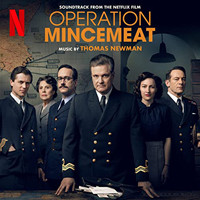- Composed by Thomas Newman
Based on an intelligence operation performed late in WWII by the British to fool the Germans into thinking they were planning to invade Greece (rather than Sicily) – with a fictional love triangle thrown in for good measure – John Madden’s Operation Mincemeat has attracted reasonable reviews and offered the director to re-team with his Best Marigold Hotel composer Thomas Newman. I was not alone in thinking for a long time that Newman was one of the finest film composers of his generation, tackling serious dramas with great skill and no shortage of flair for year after year, before flexing his muscles on a wider range of projects as time went by – and then seemingly losing interest in painting with the kind of broad strokes that drew so many towards him, concentrating in recent years very much more on much more low-key music, with the quirks that were always such a big part of his sound relegated somewhat to sounding like a bag of tricks being opened a few too many times. He is – of course – still the same extraordinarily gifted composer that he always was, and so there are usually some moments within scores where that old magic is present; sadly Operation Mincemeat is not the score that sees them coming back and taking over as the prevalent element. It is all impeccably done in terms of being a singular musical vision with some dramatic substance behind it; and it’s a sound that has always been present in his writing, but perhaps the one sound in there that never seemed likely to become the dominant one.
Tonally, the score reminds me quite a lot of the subtlest moments of the composer’s two Bond scores, with (not surprisingly) a bit of 1917 thrown in for good measure (but not the bit you’d want). Nothing here suggests time or place – instead Newman goes for a very monochromatic palette, electronic sounds combining with mostly-muted orchestral forces to create a dark, sometimes choppy atmosphere almost from start to end. Disastrously-placed source music interrupts whatever spell is being cast by the music and must be programmed out at all costs; doing that leaves an hour or so of a kind of sleepy, trippy atmosphere where stretches of ambience are occasionally interrupted by kaleidoscopic moments of grandeur. The best of themes occur in a couple of later tracks, “Operation Mincemeat” and “Limited Casualties”, which offer a solid nine minutes or so of score highlights, without ever approaching the soaring heights of 1917 at its best. The rest – I hate to say, but not only have we heard it all before, we’ve heard Newman do it so much better before. He’s evidently arrived at a place where he feels like this sort of music is what he wants to write, and I doubt anyone would have many complaints about how it supports the films he works on, but it’s clearly not the place I would wish he had arrived at – the days of him solving whatever musical challenges a film may present in an outward, eye-catching way are clearly over, at least for now. Perhaps this is how he feels he can best function in the film music world of 2022, which is clearly very different from the film music world as he was making his name. It does seem a bit of a shame.
Rating: **
facebook.com/moviewave | twitter.com/MovieWaveDotNet | amazon.com












I agree 100 %. Major letdown…again. You wouldn’t know this is a war movie from the music. It could fit in any modern thriller. I’m afraid to call it what it is…a real bore.
Unfortunately, as a long-standing fan of Thomas Newman’s film scores, I largely agree with these points. Since he scored Victoria & Abdul, with the exceptions of Tolkien and 1917, all of his film scores have underwhelmed me or not been substantial enough to get soundtrack releases. At some levels I found Operation Mincemeat more disappointing than The Little Things, as Operation Mincemeat is the kind of film that could have inspired him to write a score more like the one for Bridge of Spies, or perhaps the two Bond films.
I remember Thomas Newman getting stuck in a rut a couple of times earlier, around 2000-02 with Erin Brockovich through to In the Bedroom and again to a lesser extent around 2009-2011 with underwhelming scores like The Debt and The Adjustment Bureau, so I retain some hope that he might turn it around again, most likely with Sam Mendes’s upcoming Empire of Light.
I don’t think it’s that bad. In fact, I think much of it is pretty good. I consider it a warmer and more developed follow-up to 1917. The “Limited Casualties” cue is the highlight, another excellent cello-led piece that almost stands with “Come Back to Us” from 1917.